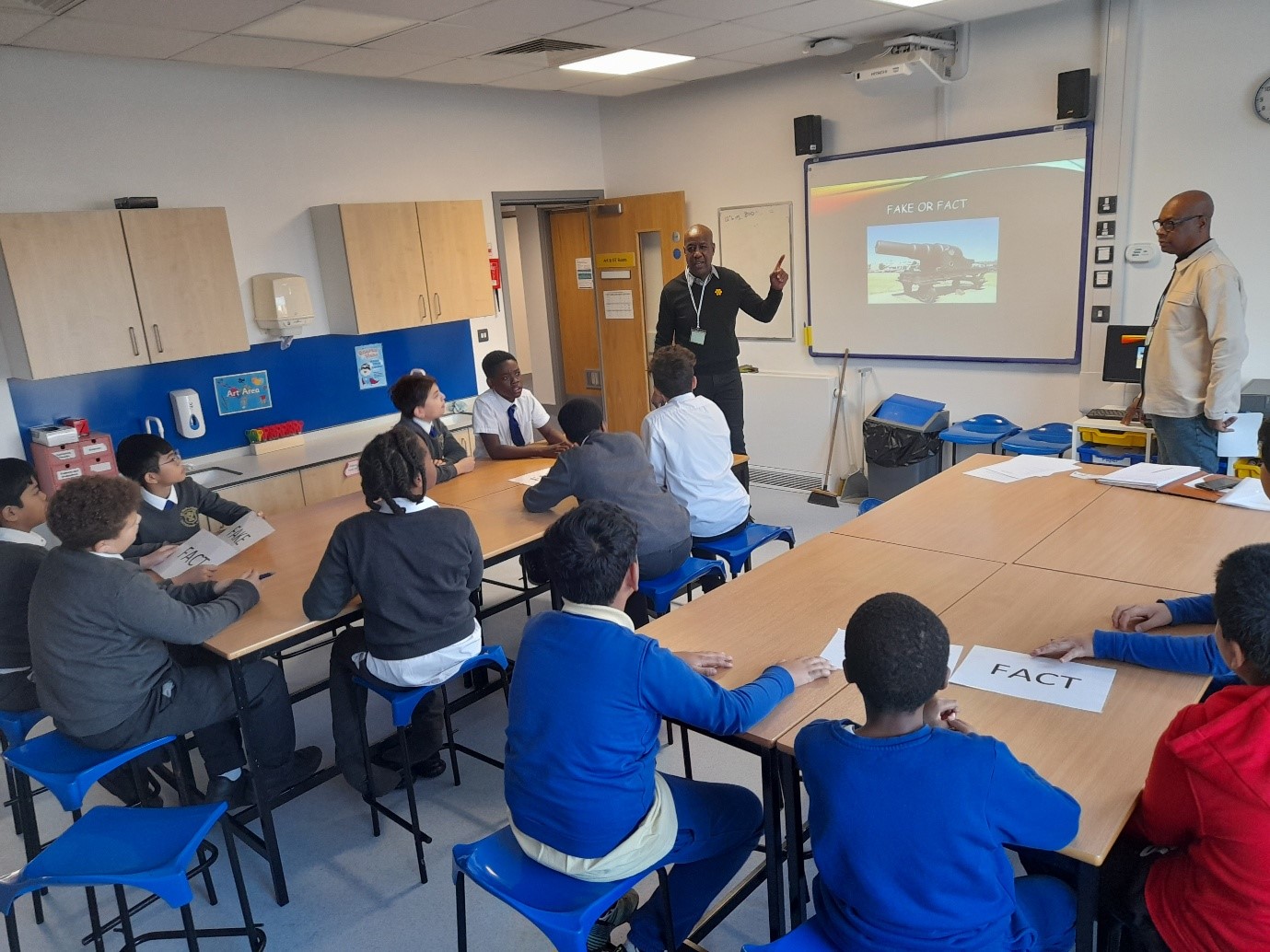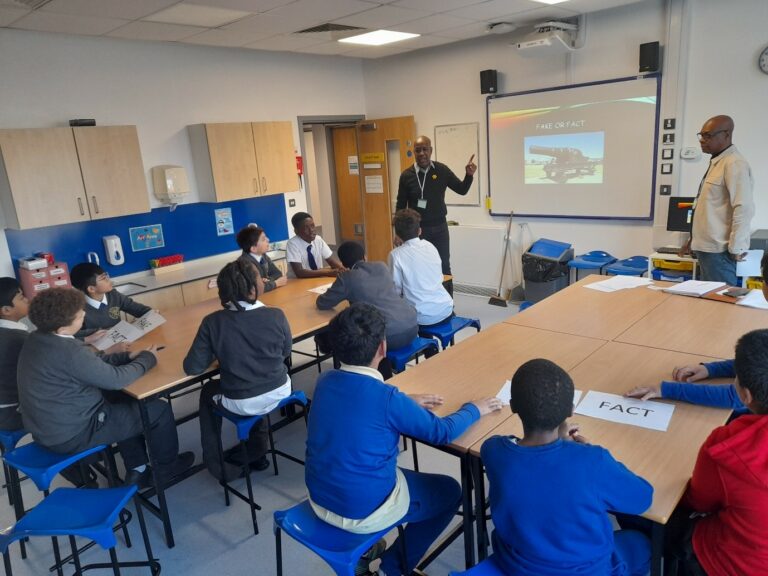Propel Case Study: Action for Race Equality
Systems change as a route to deeper impact
Action for Race Equality’s mission is to end racial inequality.
Routes2Success (R2S) is one of Action for Race Equality’s longest running programmes and has been funded by Propel for three years. It is aimed at 10 to 25-year-olds from Black, Asian, Mixed Heritage and Arab backgrounds who live in London. Matched with positive role models from similar backgrounds to themselves, young people are supported through single gendered groups and one-to-one mentoring in their educational setting, to help with career choices, building entrepreneurial skills, overcoming obstacles, and personal development.
In recent years the R2S programme has also developed another arm to their offer, the Race Equality Action Projects. Here mentors work with young people over six to 10 weeks to help overcome obstacles that affect them and build up their skills in areas that interest them, e.g. podcast production, interviewing.
R2S project members have only recently started to think about their work in terms of systems change. Systems change framing is helping them think about the impact their work can have beyond the individual children and young people they mentor and support. They are beginning to think about what adaptations are needed to their current model of working to have a greater impact on the school systems in which they operate, as well the wider education and employment systems.
The systems change journey so far…
The Routes2Success project members started to think about their work in terms of systems change when they received Propel funding:
‘Before I was focussed on the difference to young people, now I am thinking about education/wider community/police. Over the last 3-6 months I am thinking about the different parts we are trying to change’
Their systems change journey so far has included:
- Raising aspirations: Through the R2S programme, Action for Race Equality seeks to raise the aspirations of individual Black, Asian, Mixed Heritage and Arab young people: ‘The approach has activated something in the young people, when school thought they might be near exclusion.’
- Supporting opportunities for peer mentors: Some of the young people that benefited from mentoring are now being supported to become peer mentors.
Reviewing the Routes2Success programme’s role in responding to the root causes: Supporting the team to think about what more they can do to influence the systems − e.g. individual schools, the wider education system − to contribute to better outcomes for Black and Brown young people, leading to longer-term shifts such as better exam results, lower exclusion rates and more young people leaving school with a career plan.

Routes2Success at Brentside School
Routes2Success has been working in Brentside school for three years providing group and one-to-one mentoring. This longer-term engagement in the school has meant the volunteer mentors are well known by the young people in the school and are able to establish a different kind of bond with them, one that sits outside a teacher/pupil context:
‘It has helped me to have someone outside of the teacher point of view, to have a safe space where I could be vulnerable and talk about stuff happening outside of school. It has helped me mentally, to be able to control my feelings’ (young person).
The young people can relate to the mentors as they are from similar backgrounds. This longer-term engagement has been enabled because of the strong relationship R2S has with the Assistant Head of the school. The deeper impact is possible because some of the young people have been supported over the years. At Brentside this means some of the young people supported in Year 9 are now involved in a Race Equality Action project. This involvement has inspired them to become peer mentors to other young people in the school, and they are being supported to make this happen.
Enablers
In order to effect systems change it was noted that the following factors are important:
- Relationships: The greatest impact was seen in schools where the Routes2Success team had been able to work with teachers over several years and relationships between the teacher, pupils and the team were strong.
- Willingness to learn, iterate and adapt: Knowing that if you want to move your impact from an individual to a systems level you may need to change the way you do things, for example, by establishing stronger relationships with the people and organisations that impact on the lives of children and young people.
- Taking a youth-led approach: The work of R2S is steered by a group made up of young people, parents, teachers and mentors, and the focus of the Race Equality Action Projects is determined by the young people.
- Taking a long-term view: It was noted that mentoring is not a quick fix. The programme has worked best when R2S has a long-term relationship with a school, supporting mentoring over a number of years, so that mentoring practices are more firmly embedded and valued as part of the school offer.
- Working collectively: While collaborating more widely with others is still nascent and funding dependent, there was a recognition that to effect real change you need to create allies and work with others. ‘(Propel) funding has enabled us to think about the organisations we want to work with where we have similar aims and objectives’.
- Funding: It was noted that funding was an important element in supporting systems change. Longer-term funding enabled R2S to measure what matters to them (in this case the young people) and valued the quality/depth of work rather than volume, e.g. the number of young people reached.
Barriers and tensions
- Time: Working in partnership with other charitable partners has in reality ‘been in equal part helpful and challenging’. Tapping into the expertise of others and sharing practices and skills takes time. As a small organisation there is not much capacity for this type of work.
- Staff changes: Much of the work is dependent on one teacher in a school championing the work. When they leave, it can feel like starting over because mentoring is not currently seen to be a core offer.
- Volunteer nature of role models/mentors: This can make securing role models hard.
- The school system: There was acute awareness that ‘the curriculum is set in stone, can’t stray from it’, and this can be a challenge in itself.
- Data systems: At a school level, having information on the pupils to hand to share with the mentors would enable them to maximise their time with them. However, this information is often difficult to obtain given the size of secondary schools and their data systems.
Future Ambition
By thinking of their work through a systems lens, the Routes2Success team has considered adaptations they could make to their practice. These include:
- Longer-term interventions that will allow them to track a young person through school, for example from Year 7 to 11.
- Building stronger relationships with a wider group of teachers in the school (not just their key contact); including stronger feedback loops to capture the ripple effects mentoring has on the school as a whole.
- Amplifying the voices of the young people, their parents and the teachers about the value of this work.
- Drawing together the learning about the techniques that work to engage young people and the difference mentoring makes to the lives of the individuals − and also to the wider school.
- Broadening out their role models (e.g. role models from the police) so they are tapping into the systems they want to influence.
- Working more closely with Action for Race Equality’s policy team to get the value of mentoring recognised in a school context, building on the existing relationships Action for Race Equality has with the Department for Education, teachers’ unions, etc.
Resources
To find out more contact: [email protected]
Note: This case study was based on the insights of a teacher, young people, peer mentors and project staff involved in R2S. We thank them for their time and valuable contributions.

